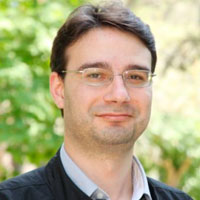Security and Risk and Conflict Analysis
Your request has been sent.
We will contact you shortly.

Innovation and research in the professional field of security and risk and conflict analysis
The Doctorate program in Security and Risk and Conflict Analysis arises in a scientific, economic and social context as a consequence of the need to provide an adequate multidimensional response to some of the most relevant problems of contemporary societies, which is security, in its many facets, as well as the analysis of the risks that can generate conflicts, and of the conflicts themselves, both national and international.
Title code (RUCT):5601421
Academic level: Doctor - RD 99/2011
MECES level: 4
Centers where it is taught - Antonio de Nebrija University
- Center Code: 28054750
- Center Name: Antonio de Nebrija University Doctoral School
Academic year in which it was implemented: 2020-2021
Access to the Doctorate Programme
The criteria to access the PhD program have been detailed in the previous section, and are those established by the law for this purpose. Therefore, any candidate who meets these criteria would have legal access to the program.
However, for people who meet these general access requirements set forth in current legislation for doctoral studies in Spain, the recommended priority profile for entering this PhD program is a graduate of a degree in the area of Security and Defense, Law, International Relations and Political Science and Administration and other graduates with postgraduate training in degrees related to these, who has also completed a master's degree whose structure contains at least 16 ECTS credits in matters related to research, including the Final Research Project. In relation to master's degrees, particular preference will be given to those who have completed the Master's degree in Security and Defense in our or another university; the Master's Degree in International Humanitarian Law, Human Rights and Operational Law; the Master's degree in Conflict Risk Management; the Master's degree in International Relations and the Master's degree in Cybercrime.
A second admissible profile will be that of people who, complying with the general access requirements set forth in the current legislation for doctoral studies in Spain and having carried out the studies indicated in the previous paragraph or similar to them but without having completed a master's degree whose structure contains at least 16 ECTS credits in subjects related to research, including the Final Research Project, is willing to carry out the appropriate training supplements. In this case, if admitted, the candidate would have to complete the necessary training supplements in accordance with what is established by the Academic Committee of the Doctoral Program. To this end, the candidate will be offered training supplements in research methodology in Security and Analysis of Risk and Conflict Management according to their lack of training assessed by the Academic Committee of the Doctorate program.
Likewise, in order to access the program, it is required that students accredit the equivalent to a B2 level of the common European framework of reference of languages (MCERL). And a B2 level also in Spanish in the case of international PhD students.
Pursuant to Royal Decree 576/2023, dated July 4, amending Article 6 of Royal Decree 99/2011, issued on January 28, which governs official doctoral studies, candidates are generally required to possess an official Spanish Bachelor's Degree, or its equivalent, and a Master’s Degree to gain admission to an official doctoral program. Additionally, admission is granted to individuals who meet any of the specified exceptional criteria:
- a) Candidates must either hold an official Spanish university degree, or an equivalent degree, having earned at least 300 ECTS credits and attained Level 3 of the Spanish Framework of Qualifications for Higher Education.
- b) Individuals with degrees from foreign educational systems within the European Higher Education Area (EHEA), without the need for official approval, and that accredit a Level 7 of the European Qualifications Framework, provided the degree allows for doctoral study in the country of issuance. It should be noted that admission under this criterion does not equate to homologation of the applicant’s prior degree, nor its acknowledgment for any purposes beyond entry into doctoral education.
- c) Candidates with a degree from foreign educational systems outside of the EHEA can also be considered for admission without the need for formal approval. The university will verify that the degree certifies a level of education equivalent to an official Spanish university Master’s degree and allows for doctoral studies in the country where the degree was issued. Admission in this category does not constitute homologation or recognition of the prior degree for any purposes beyond doctoral education.
- d) Individuals with an additional Doctorate degree.
- e) Additionally, university graduates who have secured a position in specialized health training and have successfully completed at least two years in a program to obtain an official degree in any of the Health Sciences specialties are considered eligible for doctoral studies.
The following scale is established for access to these doctoral programs:
- (60%) Candidate's curriculum vitae and pre-doctoral training. The CV, the Master's curriculum, the academic transcript obtained in the completed program and the Master's Final Research Project (or equivalent research work) will be particularly evaluated.
- (20%) Personal interview with the doctoral program coordinator, who will produce an assessment report. The interview will focus on pre-doctoral academic training, training in research methodology, research and professional experience in the lines of the doctoral program, the candidate's research interests, the level of English and /or Spanish proficiency (see Access Requirements). This interview may be conducted by telematic means in case the candidate resides abroad.
- (20%) Adaptation of the candidate's profile to some line of research of the SEGERICO group, assessing the candidate's pre-doctoral training and research interests.
The academic commission of the degree is responsible for the admission procedure.
- Completed and signed application
- An updated Curriculum Vitae
- Certified copy of the bachelor's (or undergraduate) degree*
- Certified copy of the official Master's degree*
- Certified copy of the curriculum for Master's studies (or similar)*
- Copia compulsada del certificado académico del Grado*
- Copia compulsada del certificado de la universidad de origen que acredite la posibilidad de acceso a estudios de doctorado en su país desde la titulación obtenida (en caso de estudios extranjeros).
- Photocopy of ID (Spanish) or passport (foreigners)
- A photo (passport-size)
- A PDF copy of your Final Research Project or Diploma of Advanced Studies (if applicable)
- A letter of recommendation (from your Final Research Project director or from anyone who can refer research experience)
- Proof of work activity (if applying for part-time admission)
- A thesis project outline containing Objectives (and/or Research Questions) / Methodology / Expected Results
- Accredit the equivalent to B2 of English of the Common European Framework of Reference for Languages (CEFR)
- Accredit the equivalent to the B2 of Spanish of the CEFR, in case of non-Spanish speakers
* In the case of non-European diplomas: "apostille" in documents issued in countries that have signed the Hague Convention or legalization through diplomatic channels, in other cases
**If the documentation has not been issued in Spanish, it must be accompanied by the corresponding official sworn translation
Send the application with all the documentation by e-mail to escueladoctorado@nebrija.es
Definitive resolution admission 2024-2025
- September 1 – October 15
Please email your completed and signed admission application, along with the required program documentation. Refer to the "Application" section on our website for more details. - October 21
You will receive an email notification about the provisional decision regarding the admission to the doctorate program. - October 22 – 24
A three-day period will be provided, starting from the date of the provisional admission notification, for you to submit any claims via email. - Until October 25
All claims will be resolved.
An email notification will be sent out with the final list of admitted applicants. - October 21 – November 8
If you are admitted, please mail the completed and signed application, along with the previously sent documentation, to the following address:
Universidad Nebrija – Escuela de Doctorado
Campus de La Berzosa
28240 Hoyo de Manzanares (Madrid).
Please note, if the required documentation is not provided within the specified period, the Doctoral School will cancel your enrollment application.
- October 21 – November 22
You can self-enroll through the Universitas XXI application.
Please email the proof of payment for the registration fees and annual tuition fees for the doctorate program to admincp@nebrija.es and escueladoctorado@nebrija.es.
Students who are admitted but fail to enroll within the period specified by the Doctoral School will forfeit their place in the program.
| PhD Programs | AMOUNT ECTS S/TOTAL 21-22 | Training Complements (6 ECTS) |
| Doctorate in Security and Risk and Conflict Analysis | 171 € | 1.026 € |
Those candidates admitted to the program but who do not have sufficient specific training in research methodology in Security and Risk and Conflict Analysis must carry out additional training actions to their previous training.
Specifically, they will have to take a minimum of 6 ECTS credits, depending on the assessment of the candidate's education by the Academic Committee of the Doctoral program. Given their complementary nature, these credits must be taken by students during the first year of the doctorate program.
The criteria and procedures that will be applied to assess whether or not candidates have sufficient specific training in Research Methodology will be:
- a) Analysis of your Curriculum Vitae and the Curriculum with which you have completed your Level 7 studies (Master’s degree or Diploma of Advanced Studies).
- b) Analysis and evaluation of the research methodology with which the candidate carried out his/her supervised Master's or Diploma of Advanced Studies research work.
The subject proposed as a complement to training is as follows:
- Research methodology (6 ECTS credits)
Below is a brief description of the contents, competences, training activities and evaluation systems of the subjects.
| PhD Programs | AMOUNT ECTS S/TOTAL 21-22 | Training Complements (6 ECTS) |
| Doctorate in Security and Risk and Conflict Analysis | 171 € | 1.026 € |
In each academic year, until the reading of the thesis, the student must renew the registration within the established period.
- In the first year the PhD student must pay the registration fee and the annual supervision fee:
- Full-time: €450 registration fee and €1100 annual supervision fee.
- Part-time: €980 registration fee and €570 annual supervision fee.
- From the second year until the end of the thesis, you will have to pay the annual supervision fee, full time €1,100 or part time €570.
- In order to be able to defend the thesis, the PhD student must pay the thesis deposit: €1,600.
- Issuing of the doctoral degree: €311.
The Doctoral Commission can also be asked annually for partial exemptions from the doctoral fees for doctoral students who actively collaborate in Nebrija research groups, among others.
Organization
In accordance with Royal Decree 576/2023, of July 4, which modifies Royal Decree 99/2011, of January 28, which regulates official doctoral teachings:
- Full-time students:
The duration of doctoral studies will be a maximum of four full-time years, counting from the date of registration of the doctoral student in the program until the date they deposit the doctoral thesis. (Before the end of the aforementioned period, if the application for deposit of the thesis is not submitted, the Academic Committee responsible for the program, upon request of the doctoral student, may authorize the extension of this period for one more year, under the conditions established in the corresponding doctoral program). - Part-time students:
The academic committee responsible for the doctoral program may authorize the completion of doctoral studies on a part-time basis. To apply for this modality, candidates will have to prove some work activity. In this case, these studies may have a maximum duration of seven years from the date of enrollment in the program to the date they deposit their doctoral thesis. (Before the end of the aforementioned period, if the application for deposit of the thesis has not been submitted, the Academic Committee responsible for the program, upon request of the doctoral student, may authorize the extension of this period for one more year, under the conditions established in the corresponding doctoral program).
Security and risk and conflict analysis
Subjects:
- The transformation of security: Challenges of the global society and diversification of actors. Terrorism.
- European Union: security, defense and resilience.
- Humanitarian Law.
- Conflict-human rights relationship.
- Judicial settlement, mediation, arbitration and conciliation: alternative formulas for conflict resolution.
- The analysis of security risks and the conflicts that underlie them. Psychology of violence.
Basic or General Competences
- BC11. Systematic understanding of a field of study and mastery of research skills and methods related to that field.
- BC12. Ability to conceive, design and create, implement and adopt a substantial research or creation process
- BC13. Ability to contribute to the expansion of knowledge frontiers through original research.
- BC14. Ability to perform a critical analysis and evaluation and synthesis of new and complex ideas.
- BC15. Ability to communicate with the academic and scientific community and with society in general about their fields of knowledge in the modes and languages commonly used in their international scientific community.
- BC16. Ability to promote, in academic and professional contexts, scientific, technological, social, artistic or cultural progress within a knowledge-based society.
- BC17. In alignment with Article 12 of Organic Law 2/2023, dated March 22, doctoral students should demonstrate their ability to advocate for and advance Open Science and Citizen Science, as a way to contribute to the consideration of scientific knowledge as a common good, through the evaluation of transversal activities carried out by the doctoral student with regards to different dimensions of Open Science and Citizen Science, as well as the training acquired in both disciplines in micro-credentials or similar format.
Personal skills and abilities
- AC01. Get along in contexts where there is little specific information.
- AC02. Find the key questions to answer to solve a complex problem.
- AC03. Design, create, develop and undertake new and innovative projects in their field of knowledge.
- AC04. Work both as a team and autonomously in an international or multidisciplinary context.
- AC05. Integrate knowledge, face complexity and make judgments with limited information.
- AC06. The criticism and intellectual defense of solutions
Doctoral students will have to take 115 hours of training, 45 hours of which will be cross-curricular (common to all doctoral students of the university) and 70 hours of specific training.
- Cross-curricular education: The PhD student will have to perform 16 hours of mandatory activities + 29 hours of elective activities.
- 70 hours of specific training are mandatory.
The distribution of activities in full-time dedication has a decreasing logic and is concentrated in three years, while in the case of part-time studies it is distributed over five years of training.
Specific educational activities for this Doctorate
Specific educational activities 24/25
Specific educational activities 23/24
Control procedure
At least one publication with the following indexing: articles in SCOPUS scientific journals or book chapters, and books in first SPI positions.
Professors
 Gracia Abad Quintanal
Doctora en Relaciones Internacionales y Licenciada en Ciencias Políticas y de la Administración por la Universidad Complutense de Madrid. Profesora Agregada de Relaciones Internacionales en la Universidad Antonio de Nebrija. Con anterioridad, profesora de grado y posgrado en las Universidad Complutense, en la Universidad Pontificia Comillas, Saint Louis University, San Pablo CEU, Camilo José Cela y Universidad de Salamanca. Conferenciante en numerosas universidades entre las que cabe mencionar Syracuse University, Richmond University, Universidad Pontificia Comillas, Universidad de Valladolid, Universidad Complutense o Royal Holloway. Ha sido investigadora visitante en Royal Holloway, Universidad de Londres, la Universidad de Coimbra, el European Policy Center de Bruselas y la Rajaratnam School of International Studies de Singapur. Entre sus líneas de investigación cabe destacar la seguridad internacional, las organizaciones internacionales, los procesos de integración y el multilateralismo, las relaciones internacionales de Asia Oriental y la política exterior y de seguridad china. Es autora y coautora de numerosas publicaciones sobre estos temas
Gracia Abad Quintanal
Doctora en Relaciones Internacionales y Licenciada en Ciencias Políticas y de la Administración por la Universidad Complutense de Madrid. Profesora Agregada de Relaciones Internacionales en la Universidad Antonio de Nebrija. Con anterioridad, profesora de grado y posgrado en las Universidad Complutense, en la Universidad Pontificia Comillas, Saint Louis University, San Pablo CEU, Camilo José Cela y Universidad de Salamanca. Conferenciante en numerosas universidades entre las que cabe mencionar Syracuse University, Richmond University, Universidad Pontificia Comillas, Universidad de Valladolid, Universidad Complutense o Royal Holloway. Ha sido investigadora visitante en Royal Holloway, Universidad de Londres, la Universidad de Coimbra, el European Policy Center de Bruselas y la Rajaratnam School of International Studies de Singapur. Entre sus líneas de investigación cabe destacar la seguridad internacional, las organizaciones internacionales, los procesos de integración y el multilateralismo, las relaciones internacionales de Asia Oriental y la política exterior y de seguridad china. Es autora y coautora de numerosas publicaciones sobre estos temas
 Adela Alija Garabito
Licenciada en Geografía e Historia, especialidad en Historia Contemporánea y Doctora en Historia por la Universidad Complutense de Madrid. Es especialista en Historia de las Relaciones Internacionales. Miembro de la Comisión Española de Historiadores de las Relaciones Internacionales (CEHRI). Ha dirigido el grupo de investigación RICINTAR (Relaciones Internacionales Cooperación e Integración en Áreas Regionales) y es miembro del Grupo interuniversitario de Investigación en Historia de las Relaciones Internacionales (GHistRI). Ha participado y participa en proyectos de investigación financiados por distintas instituciones. Ponente en numerosos congresos nacionales e internacionales en Universidades e instituciones; es autora y coautora de obras relacionadas con sus líneas de trabajo: historia de las relaciones internacionales, seguridad internacional, política exterior de España, historia de la integración europea, relaciones de España con América Latina y con Europa…y sobre innovación docente en las asignaturas que imparte. Es Directora del Departamento y del área de Relaciones Internacionales de la Facultad de Ciencias Sociales de la Universidad Antonio de Nebrija. Directora del Grado en Relaciones Internacionales, de cuya Memoria e implantación es responsable. Ha sido conferenciante en distintas universidades como la Universidad de Coimbra, la Universidad ESPM de Sao Paulo y de Rio de Janeiro, en la Universidad Pontificia de Comillas, en la Universidad Complutense de Madrid, en la Universidad San Pablo CEU, Ramón Llul, etc. Forma parte del Comité científico de la Cátedra Nebrija Global Santander de Gestión de riesgos y conflictos de la Universidad Nebrija.
Adela Alija Garabito
Licenciada en Geografía e Historia, especialidad en Historia Contemporánea y Doctora en Historia por la Universidad Complutense de Madrid. Es especialista en Historia de las Relaciones Internacionales. Miembro de la Comisión Española de Historiadores de las Relaciones Internacionales (CEHRI). Ha dirigido el grupo de investigación RICINTAR (Relaciones Internacionales Cooperación e Integración en Áreas Regionales) y es miembro del Grupo interuniversitario de Investigación en Historia de las Relaciones Internacionales (GHistRI). Ha participado y participa en proyectos de investigación financiados por distintas instituciones. Ponente en numerosos congresos nacionales e internacionales en Universidades e instituciones; es autora y coautora de obras relacionadas con sus líneas de trabajo: historia de las relaciones internacionales, seguridad internacional, política exterior de España, historia de la integración europea, relaciones de España con América Latina y con Europa…y sobre innovación docente en las asignaturas que imparte. Es Directora del Departamento y del área de Relaciones Internacionales de la Facultad de Ciencias Sociales de la Universidad Antonio de Nebrija. Directora del Grado en Relaciones Internacionales, de cuya Memoria e implantación es responsable. Ha sido conferenciante en distintas universidades como la Universidad de Coimbra, la Universidad ESPM de Sao Paulo y de Rio de Janeiro, en la Universidad Pontificia de Comillas, en la Universidad Complutense de Madrid, en la Universidad San Pablo CEU, Ramón Llul, etc. Forma parte del Comité científico de la Cátedra Nebrija Global Santander de Gestión de riesgos y conflictos de la Universidad Nebrija.
 Concepción Anguita Olmedo
Profesora Titular de la Universidad Complutense de Madrid. Doctora en Relaciones Internacionales por la Universidad Complutense de Madrid. Diplomada en Altos Estudios de la Defensa por el CESEDEN. Sus principales áreas de investigación son la seguridad internacional, crimen organizado, terrorismo y ciberdelincuencia. Investigadora del Instituto Complutense de Estudios Internacionales (ICEI) y del Centro de Estudios sobre Crimen Organizado (CeCOT) del Instituto de Relaciones Internacionales de la Universidad de La Plata (Argentina), así como miembro de Global Initiative against Transnational Organized Crime. Es Asesora del Vicerrectorado de Estudios de la UCM en materia de estrategia e internacionalización; anteriormente, ha sido Vicedecana de la Facultad de Ciencias Políticas y Sociología, Coordinadora del Máster UCM-CESEDEN en Política de Defensa y Seguridad Internacional y del Máster en Relaciones Internacionales, y Secretaria Docente del Departamento. Ha realizado estancias docentes o de investigación en el Colegio Interamericano de Defensa (Washington), Universidad de California en San Diego, Universidad de California en Los Ángeles (UCLA), Escola de Comando y Estado Mayor del Ejercito (ECEME) de Brasil, Academia Nacional de Estudios Políticos y Estratégicos de Chile (ANEPE), Universidad de La Plata, Universidad de Lanús, Universidad Autónoma de Lisboa, Universidad de Coimbra, Universidad de Varsovia y Universidad Rusa de la Amistad de los Pueblos. Profesora Honoris Causa nombrada por el Ministerio de Defensa de Brasil, a propuesta de la ECEME. Cruz del Mérito Militar con Distintivo Blanco, concedida por el Ministerio de Defensa de España.
Concepción Anguita Olmedo
Profesora Titular de la Universidad Complutense de Madrid. Doctora en Relaciones Internacionales por la Universidad Complutense de Madrid. Diplomada en Altos Estudios de la Defensa por el CESEDEN. Sus principales áreas de investigación son la seguridad internacional, crimen organizado, terrorismo y ciberdelincuencia. Investigadora del Instituto Complutense de Estudios Internacionales (ICEI) y del Centro de Estudios sobre Crimen Organizado (CeCOT) del Instituto de Relaciones Internacionales de la Universidad de La Plata (Argentina), así como miembro de Global Initiative against Transnational Organized Crime. Es Asesora del Vicerrectorado de Estudios de la UCM en materia de estrategia e internacionalización; anteriormente, ha sido Vicedecana de la Facultad de Ciencias Políticas y Sociología, Coordinadora del Máster UCM-CESEDEN en Política de Defensa y Seguridad Internacional y del Máster en Relaciones Internacionales, y Secretaria Docente del Departamento. Ha realizado estancias docentes o de investigación en el Colegio Interamericano de Defensa (Washington), Universidad de California en San Diego, Universidad de California en Los Ángeles (UCLA), Escola de Comando y Estado Mayor del Ejercito (ECEME) de Brasil, Academia Nacional de Estudios Políticos y Estratégicos de Chile (ANEPE), Universidad de La Plata, Universidad de Lanús, Universidad Autónoma de Lisboa, Universidad de Coimbra, Universidad de Varsovia y Universidad Rusa de la Amistad de los Pueblos. Profesora Honoris Causa nombrada por el Ministerio de Defensa de Brasil, a propuesta de la ECEME. Cruz del Mérito Militar con Distintivo Blanco, concedida por el Ministerio de Defensa de España.
 Pablo Nicolás Biderbost
Profesor invitado. Es Profesor Permanente Laboral del Dpto. de Sociología y Comunicación de la Universidad de Salamanca. Doctor en Ciencia Política (Mención Europea), Universidad de Salamanca. Master en Estudios Latinoamericanos, Universidad de Salamanca. Máster en Social Science Data Analysis, Universidad de Essex. Licenciado en Ciencia Política, Universidad Católica de Córdoba. Es Profesor Universitario en Ciencia Política (Grado Universitario de la Universidad Maza). Posee un postgrado en Gestión y Control de Políticas Públicas por FLACSO.
Pablo Nicolás Biderbost
Profesor invitado. Es Profesor Permanente Laboral del Dpto. de Sociología y Comunicación de la Universidad de Salamanca. Doctor en Ciencia Política (Mención Europea), Universidad de Salamanca. Master en Estudios Latinoamericanos, Universidad de Salamanca. Máster en Social Science Data Analysis, Universidad de Essex. Licenciado en Ciencia Política, Universidad Católica de Córdoba. Es Profesor Universitario en Ciencia Política (Grado Universitario de la Universidad Maza). Posee un postgrado en Gestión y Control de Políticas Públicas por FLACSO.
Fue Profesor Titular (Associate Professor) del Departamento de Relaciones Internacionales de la Universidad Pontificia Comillas. Fue Director de los Grados en Relaciones Internacionales, Global Communication y Traducción e Interpretación de la Facultad de Ciencias Humanas y Sociales. Ha ejecutado proyectos de transferencia para, entre otras organizaciones, el Banco Mundial, el Banco Interamericano de Desarrollo, la UNESCO, la Unión Europea, USAID, EULAC Foundation, UNODC, UNDP, Global Compact, Programa Conjunto de Seguridad Humana de Naciones Unidas, Ministerio de Trabajo, Migraciones e Inclusión Social (España), la Organización Internacional para las Migraciones y la European Asylum Support Office. Es miembro del grupo de expertos del Consejo de Europa en Materia Anticorrupción.
Es autor de libros, capítulos de libros, artículos e informes técnicos sobre metodología de la investigación, política latinoamericana, innovación pública, herramientas anti-corrupción, responsabilidad social y dimensión política de procesos migratorios.
 Sonia Boulos
Doctora en Ciencias Jurídicas por la Universidad de Notre Dame (EEUU). Es experta en el área de derecho internacional de los derechos humanos. Ha obtenido un Máster en Derecho internacional de los derechos humanos por la misma Universidad. Licenciada en Derecho por la Universidad de Haifa, Israel. Boulos ha recibido una beca Fullbright para estudios doctorales en EEUU, y una beca de investigación por la Universidad de Notre Dame para realizar parte de su investigación predoctoral en el instituto internacional de derechos humanos en Estrasburgo y también en el tribunal europeo de derechos humanos. Ha publicado como autora y coautora diversas obras relacionadas con el derecho internacional de los derechos humanos y el derecho internacional y el uso de la fuerza. Ha sido asistente de enseñanza (Teaching Assistant) en el departamento de filosofía en la Universidad de Haifa, Israel. También ha sido una profesora asociada en el departamento de derecho en IE University, España. Ha trabajado como abogada en la Asociación para los Derechos Civiles en Israel y fue un miembro del “The Working Group for Equality in Personal Status Law in Israel”. Entre otras organizaciones, Boulos hizo una pasantía de investigación post-grado en REDRESS, una organización destinada a la erradicación de la tortura y a la búsqueda de justicia para los sobrevivientes de tortura localizado en Londres, Reino Unido.
Sonia Boulos
Doctora en Ciencias Jurídicas por la Universidad de Notre Dame (EEUU). Es experta en el área de derecho internacional de los derechos humanos. Ha obtenido un Máster en Derecho internacional de los derechos humanos por la misma Universidad. Licenciada en Derecho por la Universidad de Haifa, Israel. Boulos ha recibido una beca Fullbright para estudios doctorales en EEUU, y una beca de investigación por la Universidad de Notre Dame para realizar parte de su investigación predoctoral en el instituto internacional de derechos humanos en Estrasburgo y también en el tribunal europeo de derechos humanos. Ha publicado como autora y coautora diversas obras relacionadas con el derecho internacional de los derechos humanos y el derecho internacional y el uso de la fuerza. Ha sido asistente de enseñanza (Teaching Assistant) en el departamento de filosofía en la Universidad de Haifa, Israel. También ha sido una profesora asociada en el departamento de derecho en IE University, España. Ha trabajado como abogada en la Asociación para los Derechos Civiles en Israel y fue un miembro del “The Working Group for Equality in Personal Status Law in Israel”. Entre otras organizaciones, Boulos hizo una pasantía de investigación post-grado en REDRESS, una organización destinada a la erradicación de la tortura y a la búsqueda de justicia para los sobrevivientes de tortura localizado en Londres, Reino Unido.
 Santiago Budria Rodriguez
I have a BA degree in Economics by Universidad Pompeu Fabra (1996) and a PhD in Quantitative Economics by the University of Alicante (2003) under the QED doctoral program of the Department of Economic Analysis. I worked as Assistant Professor in Alicante’s Department from 1997 to 2001, and at the Department of Statistics at Carlos III University in 2001. In 2002 I earned a 2-years position at the University of Madeira as a predoctoral research fellow in a long-duration competitive project (code: HPSE-CT-2002-00108) financed under the 7th Framework Programme of the European Commission. After the project, I was hired as an Associate Professor and became Scientific Coordinator of the CEEAplA, a Portuguese research centre regarded as “Excellent” and financed by the Portuguese FCT (2004-2013). In 2013 I returned to Spain and worked as a researcher and assistant professor at different institutions, including the Bank of Spain, U. Pontificia Comillas and IE University. Currently, I serve as Full Professor in Economics at the Department of Business Administration at U. Nebrija. I am a microeconometrician mostly interested in labour, education, inequality and well-being. At the present time I am pursuing work investigating the role of personality traits, economic status and economic insecurity in determining well-being levels in modern societies. I have published 23 JCR papers and 3 book chapters. I have one certified sexenio (2007-2012) and another “alive” sexenio (2013-2018) that will be requested in December this year.
Santiago Budria Rodriguez
I have a BA degree in Economics by Universidad Pompeu Fabra (1996) and a PhD in Quantitative Economics by the University of Alicante (2003) under the QED doctoral program of the Department of Economic Analysis. I worked as Assistant Professor in Alicante’s Department from 1997 to 2001, and at the Department of Statistics at Carlos III University in 2001. In 2002 I earned a 2-years position at the University of Madeira as a predoctoral research fellow in a long-duration competitive project (code: HPSE-CT-2002-00108) financed under the 7th Framework Programme of the European Commission. After the project, I was hired as an Associate Professor and became Scientific Coordinator of the CEEAplA, a Portuguese research centre regarded as “Excellent” and financed by the Portuguese FCT (2004-2013). In 2013 I returned to Spain and worked as a researcher and assistant professor at different institutions, including the Bank of Spain, U. Pontificia Comillas and IE University. Currently, I serve as Full Professor in Economics at the Department of Business Administration at U. Nebrija. I am a microeconometrician mostly interested in labour, education, inequality and well-being. At the present time I am pursuing work investigating the role of personality traits, economic status and economic insecurity in determining well-being levels in modern societies. I have published 23 JCR papers and 3 book chapters. I have one certified sexenio (2007-2012) and another “alive” sexenio (2013-2018) that will be requested in December this year.
 Jon Andoni Duñabeitia Landaburu
Doctor en Psicología por la Universidad de La Laguna, Licenciado en Psicopedagogía por la Universidad de Deusto y Diplomado en Magisterio por la Universidad del País Vasco. Es experto en neurociencia cognitiva del lenguaje. Es Profesor Director e Investigador Principal de la Facultad de Lenguas y Educación de la Universidad Nebrija donde dirige el Grupo de Investigación LAELE, y además es científico asociado al Basque Center on Cognition, Brain and Language (BCBL), donde durante los últimos años ha dirigido el Grupo de Investigación Multilingual Literacy. También es miembro del panel de profesores de posgrado de diferentes universidades nacionales e internacionales, y forma parte de la Junta Directiva de la Sociedad Española de Psicología Experimental. Desde que inició su carrera investigadora, ha publicado más de 80 artículos en las principales revistas científicas internacionales, y es miembro del consejo editorial de varias revistas científicas con impacto internacional. Ha actuado como Investigador Principal en varios proyectos de investigación financiados por el Gobierno Vasco, el Gobierno Provincial de Gipuzkoa y el Gobierno de España. Además, participa activamente en el equipo de investigación de diferentes proyectos internacionales financiados por diferentes agencias europeas. Su trabajo de investigación se centra en el estudio científico de los aspectos relacionados con la adquisición de lenguas nativas y extranjeras a lo largo del ciclo vital, explorando el papel de la alfabetización multilingüe y el rol de la alternancia de lenguas como medio de instrucción.
Jon Andoni Duñabeitia Landaburu
Doctor en Psicología por la Universidad de La Laguna, Licenciado en Psicopedagogía por la Universidad de Deusto y Diplomado en Magisterio por la Universidad del País Vasco. Es experto en neurociencia cognitiva del lenguaje. Es Profesor Director e Investigador Principal de la Facultad de Lenguas y Educación de la Universidad Nebrija donde dirige el Grupo de Investigación LAELE, y además es científico asociado al Basque Center on Cognition, Brain and Language (BCBL), donde durante los últimos años ha dirigido el Grupo de Investigación Multilingual Literacy. También es miembro del panel de profesores de posgrado de diferentes universidades nacionales e internacionales, y forma parte de la Junta Directiva de la Sociedad Española de Psicología Experimental. Desde que inició su carrera investigadora, ha publicado más de 80 artículos en las principales revistas científicas internacionales, y es miembro del consejo editorial de varias revistas científicas con impacto internacional. Ha actuado como Investigador Principal en varios proyectos de investigación financiados por el Gobierno Vasco, el Gobierno Provincial de Gipuzkoa y el Gobierno de España. Además, participa activamente en el equipo de investigación de diferentes proyectos internacionales financiados por diferentes agencias europeas. Su trabajo de investigación se centra en el estudio científico de los aspectos relacionados con la adquisición de lenguas nativas y extranjeras a lo largo del ciclo vital, explorando el papel de la alfabetización multilingüe y el rol de la alternancia de lenguas como medio de instrucción.
 Natividad Fernández Sola
Natividad Fernández Sola
 Caterina García Segura
Caterina García Segura es Catedrática de Relaciones Internacionales en la Universitat Pompeu Fabra. Se doctoró en Ciencia Política y de la Administración por la UAB. Es vicedecana de la Facultad de Ciencias Políticas de la UPF. Es miembro del Comité científico del IBEI y del consejo asesor de Casa Asia. Forma parte de varios Consejos de Redacción o consejos editoriales de revistas especializadas y colecciones de working papers (Revista Española de Derecho Internacional, Revista Electrónica de Relaciones Internacionales, Revista Tempo Exterior. Working Papers del ICIP (Institut Català Internacional per la Pau), Working papers del IBEI). Sus principales líneas de investigación son la Teoría de la Relaciones Internacionales (EPI, orden internacional, actores no estatales, seguridad humana), los Estudios de Asia Oriental (regionalismo, seguridad energética, conflictividad marítima) y el análisis de la política exterior (española, estadounidense, japonesa).
Caterina García Segura
Caterina García Segura es Catedrática de Relaciones Internacionales en la Universitat Pompeu Fabra. Se doctoró en Ciencia Política y de la Administración por la UAB. Es vicedecana de la Facultad de Ciencias Políticas de la UPF. Es miembro del Comité científico del IBEI y del consejo asesor de Casa Asia. Forma parte de varios Consejos de Redacción o consejos editoriales de revistas especializadas y colecciones de working papers (Revista Española de Derecho Internacional, Revista Electrónica de Relaciones Internacionales, Revista Tempo Exterior. Working Papers del ICIP (Institut Català Internacional per la Pau), Working papers del IBEI). Sus principales líneas de investigación son la Teoría de la Relaciones Internacionales (EPI, orden internacional, actores no estatales, seguridad humana), los Estudios de Asia Oriental (regionalismo, seguridad energética, conflictividad marítima) y el análisis de la política exterior (española, estadounidense, japonesa).
 Almudena González del Valle
Almudena González del Valle Brena se doctoró la University of Westminster (CAMRI) (UK) con una tesis en regulación del audiovisual en la Unión Europea. Se interesa por las políticas públicas europeas, es especial de los sistemas audiovisuales. Obtuvo un M.A. in Communications en Annenberg School of Communications, (U. of Pennsylvania, US), y es licenciada en CCEE (E-2) en U.P. Comillas. Está acreditada por ACAP como profesor contratado doctor y profesor de universidad privada. Durante más de 10 años ha enseñado en universidades españolas e inglesas, tanto presencial como online. Ha publicado ampliamente en el ámbito de la regulación europea del audiovisual como en el campo de la comunicación corporativa en Europa, aunando ambos intereses académicos (Communicating CSR to a Cynical Public" en MIT Sloan Management Review (2013); A Reflection on European Regulation of Children Television, Communications Review (2013). También investiga sobre políticas de cine europeo e identidad europea. En enero de 2014 comenzó su docencia en la Facultad de Ciencias Humanas y Sociales, impartiendo "Estudios Regionales: Europa" y "European History of the 20th century", "Public Relations and Advertising" "Theory of Communication".
Almudena González del Valle
Almudena González del Valle Brena se doctoró la University of Westminster (CAMRI) (UK) con una tesis en regulación del audiovisual en la Unión Europea. Se interesa por las políticas públicas europeas, es especial de los sistemas audiovisuales. Obtuvo un M.A. in Communications en Annenberg School of Communications, (U. of Pennsylvania, US), y es licenciada en CCEE (E-2) en U.P. Comillas. Está acreditada por ACAP como profesor contratado doctor y profesor de universidad privada. Durante más de 10 años ha enseñado en universidades españolas e inglesas, tanto presencial como online. Ha publicado ampliamente en el ámbito de la regulación europea del audiovisual como en el campo de la comunicación corporativa en Europa, aunando ambos intereses académicos (Communicating CSR to a Cynical Public" en MIT Sloan Management Review (2013); A Reflection on European Regulation of Children Television, Communications Review (2013). También investiga sobre políticas de cine europeo e identidad europea. En enero de 2014 comenzó su docencia en la Facultad de Ciencias Humanas y Sociales, impartiendo "Estudios Regionales: Europa" y "European History of the 20th century", "Public Relations and Advertising" "Theory of Communication".
 Juan Manuel Goig Martínez
Juan Manuel Goig Martínez, Catedrático de Derecho Constitucional. Especialista en Derecho Constitucional Comparado y Derecho Político Iberoamericano. Es experto en derecho de extranjeria. Sus principales líneas de investigación son: derechos y libertades; Justicia Constitucional; protección de menores; multiculturalidad, inmigración y políticas de integración.
Juan Manuel Goig Martínez
Juan Manuel Goig Martínez, Catedrático de Derecho Constitucional. Especialista en Derecho Constitucional Comparado y Derecho Político Iberoamericano. Es experto en derecho de extranjeria. Sus principales líneas de investigación son: derechos y libertades; Justicia Constitucional; protección de menores; multiculturalidad, inmigración y políticas de integración.
 Michele Groppi
Dr Michele Groppi is a Lecturer in Challenges to the International Order in the Defence Studies Department (DSD), King's College London.
Michele Groppi
Dr Michele Groppi is a Lecturer in Challenges to the International Order in the Defence Studies Department (DSD), King's College London.
He obtained his BA from Stanford University (Honors) in International Relations with a thesis focusing on trade and the Israeli-Palestinian conflict. After moving to Israel, he got an MA (Summa Cum Laude) from the Interdisciplinary Center, Herzliya, in Counter-Terrorism and Homeland Security.
Michele joined King's PhD Programme in Defence Studies in 2013, concentrating on Islamist radicalisation in Italy. Through extensive field work, he concluded the largest quantitative and qualitative investigation in the field, sparking discussion within Italian academia and governmental institutions.
Dedicated to the internationalisation of the study of security, Michele founded the International Team for the Study of Security - Verona, a cultural association linked to DSD exploring multiple facets of international security, ranging from terrorism to climate change, from great power competition to pandemics, from energy security to space militarisation.
Michele is an Editorial Member of the International Institute for Counter-Terrorism (ICT) Herzliya, Israel and President of the International Team for the Study of Security- Verona ITSS.
 Caterina La Barbera
I am PhD in Human Rights from the University of Palermo, Italy (2008).
Caterina La Barbera
I am PhD in Human Rights from the University of Palermo, Italy (2008).I am Professor and a “Ramón y Cajal” research fellow at the Department of Law of Nebrija University in Madrid. I have teaching and research experience in Spanish and foreign institutions, including the University of Palermo, University of California-Berkeley, Center for Human and Social Sciences of CSIC, Center for Political and Constitutional Studies of Madrid, UNED, Complutense University and University Carlos III of Madrid. My research is located within critical studies of law and public policies . It covers human rights at the intersection between gender equality and cultural diversity and explores the material and discursive conflicts that are articulated around these two fundamental axes. I am the author of the monograph “Multicentered Feminism” (Compostampa 2009) and edited the volumes “Identity and Migration in Europe” (Springer 2015),“Igualdad de género y no discriminación en España ” (CEPC 2016), “Challenging the Borders of Justice in the Age of Migrations” (Springer 2019). I am also author of numerous publications in indexed journals and chapters of books (in English, Spanish and Italian) addressing issues related to equality and non-discrimination policies, immigration and integration policies, identity formation, diversity among women, autonomy vs cultural practices.
I have been PI of 4 competitive research projects on gender, migration and human rights, and participated in numerous national and international R&D as a team member. I am currently part of the Berkeley Comparative Equality & Anti-Discrimination Law Study Group and Gender Equality Policy in Practice. I regularly serve as a peer reviewer for Spanish and international indexed journals.
 Carlos López Gómez
Doctor por la Universidad Complutense de Madrid con la tesis "La sociedad española y la adhesión a la Comunidad Europea, (1975-1985) partidos políticos, asociaciones europeístas, interlocutores sociales.
Carlos López Gómez
Doctor por la Universidad Complutense de Madrid con la tesis "La sociedad española y la adhesión a la Comunidad Europea, (1975-1985) partidos políticos, asociaciones europeístas, interlocutores sociales.
 Adrián Nicolás Marchal
Director del Departamento de Seguridad y Defensa de la Universidad Antonio de Nebrija, Director del Grado en Criminología y Ciencias forenses de la Universidad Antonio de Nebrija desde 2020. Doctor por la Universidad de Castilla-La mancha en 2017 con la tesis titulada "El confidente en el proceso penal", calificada con sobresaliente cum laude. Máster Universitario en Ciberseguridad (UNIR), Licenciado en Criminología (UCJC), Máster Universitario en Derechos Fundamentales (UNED), Licenciado en Derecho (UC3M). Asimismo, cuento con diferentes certificaciones como "Cyber Threat Management" de CISCO o "Digital Forensics Essentials" de EC-Council. Revisor de las revistas “Talanta”, “Estudios en Seguridad y Defensa”, “Logos Guardia Civil” y miembro del Comité Editorial de la revista “Perspectivas en Inteligencia”. Empezó a impartir docencia universitaria en el año 2014, y desde entonces he impartido más de 40 asignaturas en titulaciones oficiales de diferentes Universidades, destacando la docencia en los Grados en Criminología, Grado en Derecho, Grado en Seguridad, Máster Universitario en Criminalística y Máster Universitario en análisis de Inteligencia y Ciberinteligencia. Abogado en ejercicio desde 2012, colegiado en el Ilustre Colegio de Abogados de Madrid, especializado en Derecho Penal. Perito judicial en el ámbito de la informática forense. Habilitado por el Ministerio de Interior de España como Director de Seguridad y Jefe de Seguridad.
Adrián Nicolás Marchal
Director del Departamento de Seguridad y Defensa de la Universidad Antonio de Nebrija, Director del Grado en Criminología y Ciencias forenses de la Universidad Antonio de Nebrija desde 2020. Doctor por la Universidad de Castilla-La mancha en 2017 con la tesis titulada "El confidente en el proceso penal", calificada con sobresaliente cum laude. Máster Universitario en Ciberseguridad (UNIR), Licenciado en Criminología (UCJC), Máster Universitario en Derechos Fundamentales (UNED), Licenciado en Derecho (UC3M). Asimismo, cuento con diferentes certificaciones como "Cyber Threat Management" de CISCO o "Digital Forensics Essentials" de EC-Council. Revisor de las revistas “Talanta”, “Estudios en Seguridad y Defensa”, “Logos Guardia Civil” y miembro del Comité Editorial de la revista “Perspectivas en Inteligencia”. Empezó a impartir docencia universitaria en el año 2014, y desde entonces he impartido más de 40 asignaturas en titulaciones oficiales de diferentes Universidades, destacando la docencia en los Grados en Criminología, Grado en Derecho, Grado en Seguridad, Máster Universitario en Criminalística y Máster Universitario en análisis de Inteligencia y Ciberinteligencia. Abogado en ejercicio desde 2012, colegiado en el Ilustre Colegio de Abogados de Madrid, especializado en Derecho Penal. Perito judicial en el ámbito de la informática forense. Habilitado por el Ministerio de Interior de España como Director de Seguridad y Jefe de Seguridad.
 Branislav Radeljic
Dr Branislav Radeljic is a reader in international relations within the Cass School of Education and Communities, University of East London. His main research interests focus on the study of European Union, East European and Western Balkan politics. In addition to these, Branislav is interested in, and has written about, the presence of Islam in the EU and its impact on future EU policy-making. He has held visiting fellowships at the London School of Economics and Political Science, University of California at Berkeley, University of Illinois at Urbana-Champaign, University of Michigan and University of Pittsburgh. Branislav has presented and discussed his ideas at numerous conferences and public lectures across Europe, America and Asia. Outside academia, he conducts research and provides consultancy services within his area of expertise.
Branislav Radeljic
Dr Branislav Radeljic is a reader in international relations within the Cass School of Education and Communities, University of East London. His main research interests focus on the study of European Union, East European and Western Balkan politics. In addition to these, Branislav is interested in, and has written about, the presence of Islam in the EU and its impact on future EU policy-making. He has held visiting fellowships at the London School of Economics and Political Science, University of California at Berkeley, University of Illinois at Urbana-Champaign, University of Michigan and University of Pittsburgh. Branislav has presented and discussed his ideas at numerous conferences and public lectures across Europe, America and Asia. Outside academia, he conducts research and provides consultancy services within his area of expertise.
 Javier Roldán Barbero
Nacido en Granada en 1961, se formó como estudiante y profesor en la Facultad de Derecho de su Universidad. Tesis doctoral en 1989 con la máxima calificación sobre “La Comunidad Europea y los convenios de Lomé: el Stabex”. Entre 1989 y 1992 es Vicedecano de su Facultad. En el curso 1992-93 se traslada a la Universidad de Almería, en la que obtiene la cátedra de Derecho internacional público y Relaciones internacionales en 1995. Permanece en esta universidad, de cuyo departamento de Derecho público fue director, hasta el curso 2002-2003, cuando retorna como catedrático a la Universidad de Granada. Docente siempre a dedicación plena y de una pluralidad de materias en enseñanzas oficiales, obtiene en 2009 el Premio de Excelencia Docente de la Universidad de Granada. En materia de investigación, ha sido el tercer autor más citado según la lista In Recj, en la que aparece con el índice H de 4. Tiene concedidos 5 sexenios de investigación. Ha dirigido 4 tesis doctorales con la máxima calificación, y dirige en la actualidad otras 3 más. Ha sido asimismo investigador principal en el Centro Mixto Universidad de Granada-Ejército de Tierra y ha formado parte del Comité de Expertos que ha elaborado la nueva Estrategia de Seguridad Nacional en España, adoptada en 2017. Ha ampliado estudios, principalmente, en la Universidad Libre de Bruselas, en la Academia de Derecho Internacional de La Haya, en el Instituto Universitario de Florencia, en la Universidad de Ginebra, en la Universidad de París X-Nanterre y en la Universidad de París II. Ha impartido más de doscientas conferencias en centros de España y del extranjero (incluidos Florida, París o Ginebra). Es autor de más de un centenar de publicaciones sobre cuestiones muy variadas del Derecho internacional y del Derecho Europeo. Ha publicado como autor único 4 libros: “La Comunidad Europea y los Convenios de Lomé: el Stabex” (1990); “Democracia y Derecho internacional (1994); “Ensayo sobre el Derecho internacional público” (1996) y “Las relaciones exteriores de España” (2001). Como director y coautor ha publicado “La nueva política de seguridad y defensa en Europa” (2011) y “La seguridad nacional de España: un enfoque geoestratégico” (2017). Como codirector y coautor ha publicado “El estatuto de las fuerzas armadas españolas en el extranjero” (2008) y “Derecho internacional económico” (2010). Entre su centenar de artículos figuran trabajos sobre derechos humanos, democracia, mantenimiento de la paz internacional, relaciones exteriores de la Unión Europea, jurisprudencia internacional y europea, relaciones entre el Derecho internacional y el Derecho de la UE, relaciones entre el Derecho de la UE y el derecho interno español, las instituciones de la UE, aplicación territorial del Derecho, los principios de la ONU, derecho del mar, cooperación internacional para el desarrollo, la costumbre internacional, tratados y actos de organizaciones internacionales, el consentimiento y la soberanía del Estado, etc.
Javier Roldán Barbero
Nacido en Granada en 1961, se formó como estudiante y profesor en la Facultad de Derecho de su Universidad. Tesis doctoral en 1989 con la máxima calificación sobre “La Comunidad Europea y los convenios de Lomé: el Stabex”. Entre 1989 y 1992 es Vicedecano de su Facultad. En el curso 1992-93 se traslada a la Universidad de Almería, en la que obtiene la cátedra de Derecho internacional público y Relaciones internacionales en 1995. Permanece en esta universidad, de cuyo departamento de Derecho público fue director, hasta el curso 2002-2003, cuando retorna como catedrático a la Universidad de Granada. Docente siempre a dedicación plena y de una pluralidad de materias en enseñanzas oficiales, obtiene en 2009 el Premio de Excelencia Docente de la Universidad de Granada. En materia de investigación, ha sido el tercer autor más citado según la lista In Recj, en la que aparece con el índice H de 4. Tiene concedidos 5 sexenios de investigación. Ha dirigido 4 tesis doctorales con la máxima calificación, y dirige en la actualidad otras 3 más. Ha sido asimismo investigador principal en el Centro Mixto Universidad de Granada-Ejército de Tierra y ha formado parte del Comité de Expertos que ha elaborado la nueva Estrategia de Seguridad Nacional en España, adoptada en 2017. Ha ampliado estudios, principalmente, en la Universidad Libre de Bruselas, en la Academia de Derecho Internacional de La Haya, en el Instituto Universitario de Florencia, en la Universidad de Ginebra, en la Universidad de París X-Nanterre y en la Universidad de París II. Ha impartido más de doscientas conferencias en centros de España y del extranjero (incluidos Florida, París o Ginebra). Es autor de más de un centenar de publicaciones sobre cuestiones muy variadas del Derecho internacional y del Derecho Europeo. Ha publicado como autor único 4 libros: “La Comunidad Europea y los Convenios de Lomé: el Stabex” (1990); “Democracia y Derecho internacional (1994); “Ensayo sobre el Derecho internacional público” (1996) y “Las relaciones exteriores de España” (2001). Como director y coautor ha publicado “La nueva política de seguridad y defensa en Europa” (2011) y “La seguridad nacional de España: un enfoque geoestratégico” (2017). Como codirector y coautor ha publicado “El estatuto de las fuerzas armadas españolas en el extranjero” (2008) y “Derecho internacional económico” (2010). Entre su centenar de artículos figuran trabajos sobre derechos humanos, democracia, mantenimiento de la paz internacional, relaciones exteriores de la Unión Europea, jurisprudencia internacional y europea, relaciones entre el Derecho internacional y el Derecho de la UE, relaciones entre el Derecho de la UE y el derecho interno español, las instituciones de la UE, aplicación territorial del Derecho, los principios de la ONU, derecho del mar, cooperación internacional para el desarrollo, la costumbre internacional, tratados y actos de organizaciones internacionales, el consentimiento y la soberanía del Estado, etc.
 Juan Arturo Rubio Arostegui
Su actividad profesional se ha desarrollado exclusivamente en el ámbito de la cultura, tanto en la Gestión Cultural en la Administración Pública Local, como en el sector privado (Producción de artes escénicas). Durante un periodo significativo (2003-2011) compatibilizó esta dedicación profesional con la docencia como profesor asociado en la Universidad (Universidad Rey Juan Carlos y Antonio de Nebrija). Es a partir de 2011 cuando se integra como profesor a tiempo completo en la Universidad Antonio de Nebrija. Los temas de investigación de las artes y la cultura con enfoques multidisciplinares que van desde el análisis de las políticas culturales e instituciones culturales, la sociología de las artes, las culturas evaluativas en el campo académico y artístico. Es IP del grupo de Investigación Nebrija en Comunidades artísticas y académicas. En la actualidad es miembro del Consejo de Comunicación y Cultura de la Fundación Alternativas y Vocal del Comité de Sociología de las artes y la cultura de la Federación Española de Sociología. Es director de la Escuela de Doctorado de la Universidad Antonio de Nebrija.
Juan Arturo Rubio Arostegui
Su actividad profesional se ha desarrollado exclusivamente en el ámbito de la cultura, tanto en la Gestión Cultural en la Administración Pública Local, como en el sector privado (Producción de artes escénicas). Durante un periodo significativo (2003-2011) compatibilizó esta dedicación profesional con la docencia como profesor asociado en la Universidad (Universidad Rey Juan Carlos y Antonio de Nebrija). Es a partir de 2011 cuando se integra como profesor a tiempo completo en la Universidad Antonio de Nebrija. Los temas de investigación de las artes y la cultura con enfoques multidisciplinares que van desde el análisis de las políticas culturales e instituciones culturales, la sociología de las artes, las culturas evaluativas en el campo académico y artístico. Es IP del grupo de Investigación Nebrija en Comunidades artísticas y académicas. En la actualidad es miembro del Consejo de Comunicación y Cultura de la Fundación Alternativas y Vocal del Comité de Sociología de las artes y la cultura de la Federación Española de Sociología. Es director de la Escuela de Doctorado de la Universidad Antonio de Nebrija.
 Siraj Shaikh
Siraj Ahmed Shaikh is Professor of Systems Security at the Centre for Transport and Mobility Research at Coventry University, where he leads the Cyber Security Group involved in automotive and transport security.
Siraj Shaikh
Siraj Ahmed Shaikh is Professor of Systems Security at the Centre for Transport and Mobility Research at Coventry University, where he leads the Cyber Security Group involved in automotive and transport security. From February 2015 till May 2016, he was seconded to the Knowledge Transfer Network (KTN), which is the innovation network in Britain. He served as cyber security lead for the KTN coordinating activities across academia, industry and national policy. From March 2015 till March 2016, he was also seconded to HORIBA MIRA, as part of the Royal Academy of Engineering’s industrial secondment scheme.
In 2016, Siraj co-founded CyberOwl, which is a VC-backed commercial venture involved in developing early warning system for cyber threats, cyber-physical platform health and prognostics. CyberOwl is currently part of the UK’s 1st GCHQ Cyber Accelerator.
Siraj is currently involved in the EPSRC-Funded project “ECSEPA”, jointly with Cardiff University, investigating evidence-based policy-making for cyber security, working with policy partners including UK’s GCHQ/NCSC and FCO. Siraj has been involved in research, development and evaluation of large-scale distributed secure systems for over seventeen years. His doctoral and post-doctoral research involved design and verification of security and safety-critical systems. He was recently involved in an EPSRC-Funded research project investigating collusion attacks on smart phone platforms. Led by City University (UK), it also involved Swansea University (UK) and Intel Security as an industrial partner.
From 2013 to 2014, he investigated safety data modelling for the UK Rail Industry, funded by the RSSB. From 2011 to 2013, he was involved with the development of an intelligent control and guidance system for unmanned logistics vehicles for unmanned distribution capability. This work was funded by the Ministry of Defence (MoD) of UK over two phased projects, and jointly led by Siraj and Prof. Dobrila Petrovic.
From 2010 to 2012, he worked with the transport and logistics sector in the UK investigating efficient and reliable supply chain networks for consignment delivery. This initiative was led by Ricardo and funded by Technology Strategy Board (TSB) and EPSRC.
In 2011, he participated in the Pairing Scheme by The Royal Society of UK, as part of which he worked with Civil Servants at the Foreign and Commonwealth Office (FCO). In 2010, he served as a EPSRC-Funded Policy Fellow to the Department of Environment, Food and Rural Affairs (Defra) of Her Majesty’s Government (HMG), advising on secure storage and transmission of data from field-based rapid diagnostics devices.
From 2007 to 2009, he worked as a Research Fellow at Cranfield University, at the Defence Academy of the United Kingdom, and from 2006 to 2007 as a Postdoctoral Research Fellow at the International Institute of Software Technology of the United Nations University, Macau SAR China. Prior to academia he worked in the industry developing smart-card based access control systems for use by HMG.
He is the Vice-Chair for the International Federation for Information Processing (IFIP) Technical Committee 6 on Communication Systems, and also a member of the Developing Countries Support Committee (DCSC) of IFIP.
His paper titled “A Deployment Value Model for Intrusion Detection Sensors” won the Best Paper Award at the 3rd International Conference on Information Security and Assurance (ISA 2009), held in Seoul, Korea in 2009.
He has over eighty peer-reviewed research publications and has successfully supervised three Doctoral and two MRes students to completion. He is a Chartered Fellow of BCS and also Chartered Scientist (CSci).
He has served on the Program Committee (PC) for several conferences and has been the PC Co-chair for the 3rd, 4th, 6th and 8th International Workshop on Foundations and Techniques for Open Source Software Certification (OpenCert) in 2009, 2010, 2012 and 2014 respectively. He has co-edited a special issue of the journal ‘Science of Computing Programming’ for selected contributions from the OpenCert workshops (2014).
 Sara Uceda Gutiérrez
Licenciada en Psicología y doctora en Fisiología por la Universidad de Sevilla. Actualmente coordina el “Master de Cognición y Emoción” en contextos educativos de la Universidad Nebrija. Ha participado en 6 proyectos de investigación financiados, y ha publicado en revistas de reconocido prestigio.
Sara Uceda Gutiérrez
Licenciada en Psicología y doctora en Fisiología por la Universidad de Sevilla. Actualmente coordina el “Master de Cognición y Emoción” en contextos educativos de la Universidad Nebrija. Ha participado en 6 proyectos de investigación financiados, y ha publicado en revistas de reconocido prestigio.
 Maciej Zenckiewicz
Actualmente trabaja como Profesor Adjunto en el Departamento de Derecho Internacional en Nicolaus Copernicus University (Torun, Polonia). Entre 2017 y 2022 Docente Investigador de Derecho Internacional Economico en el Departamento Economico de Universidad de Externado. En su carrera cooperaba con varios universidades, e.g. Profesor Visitante de Derecho Internacional en Pontificia Universidad Católica del Perú (2022, Lima, Peru); Visiting Lecturer en Xian Jiaotong University, Faculty of Law (desde 2020, Xian, China); Visiting Scholar for Public Economic Law en Universidad Nebrija (desde 2019, Madrid, España); Researcher en Charlemagne Institute of European Studies (ICEE), Universitat Internacional de Catalunya (2016-2018, Barcelona, Espana). Desde 2017 es consultor sobre derecho internacional, especialmente derecho de inversiones y mecanismos de solución de disputas. Experiencia en consultoría interpartes en procesos ante CIADI, CCI y CPA. Asesoría para partes de procedimiento de arbitraje en varios estados de disputa (pre-arbitral, arbitraje y ejecución del laudo). Miembro de varios foros internacionales como: Society of International Economic Law; Academic Forum on ISDS; La Red Latinoamericana De Derecho Económico Internacional; ILA Polish Group. Evaluador (peer-review) en varios periódicos internacionales e.g.: Leiden Journal of International Law, Polish Yearbook of International Law, Brill Open Law, Comparative Law Review, Polish Review of International and European Law Experto electoral - participante como observador en las misiones de Observación Electoral de la Unión Europea: en Perú (2011), Honduras (2017), Venezuela (2021) y Paraguay (2023).
Maciej Zenckiewicz
Actualmente trabaja como Profesor Adjunto en el Departamento de Derecho Internacional en Nicolaus Copernicus University (Torun, Polonia). Entre 2017 y 2022 Docente Investigador de Derecho Internacional Economico en el Departamento Economico de Universidad de Externado. En su carrera cooperaba con varios universidades, e.g. Profesor Visitante de Derecho Internacional en Pontificia Universidad Católica del Perú (2022, Lima, Peru); Visiting Lecturer en Xian Jiaotong University, Faculty of Law (desde 2020, Xian, China); Visiting Scholar for Public Economic Law en Universidad Nebrija (desde 2019, Madrid, España); Researcher en Charlemagne Institute of European Studies (ICEE), Universitat Internacional de Catalunya (2016-2018, Barcelona, Espana). Desde 2017 es consultor sobre derecho internacional, especialmente derecho de inversiones y mecanismos de solución de disputas. Experiencia en consultoría interpartes en procesos ante CIADI, CCI y CPA. Asesoría para partes de procedimiento de arbitraje en varios estados de disputa (pre-arbitral, arbitraje y ejecución del laudo). Miembro de varios foros internacionales como: Society of International Economic Law; Academic Forum on ISDS; La Red Latinoamericana De Derecho Económico Internacional; ILA Polish Group. Evaluador (peer-review) en varios periódicos internacionales e.g.: Leiden Journal of International Law, Polish Yearbook of International Law, Brill Open Law, Comparative Law Review, Polish Review of International and European Law Experto electoral - participante como observador en las misiones de Observación Electoral de la Unión Europea: en Perú (2011), Honduras (2017), Venezuela (2021) y Paraguay (2023).
Comisión académica
- Presidenta: Gracia Abad Quintanal
- Secretario: Alfonso López de la Osa
- Vocal: Sonia Boulos
Academic committee
- President: Gracia Abad Quintanal
- Secretary: Alfonso López de la Osa
- Chainperson: Sonia Boulos
Start your Admission Process Get information for New Students
Employability
Career Opportunities
- Professionals in the security sector, and in particular in the State security forces.
- Members of the Diplomatic Corps.
- Officials of International Organizations related to security issues, peaceful settlement of disputes and human rights.
- Teachers in Higher Education Institutions.
- Scientists in research and teaching centers related to security and conflict resolution.
Agreements
Direct collaborations
Universidad para la Paz de las Naciones Unidas
Higher Institute for Defense “General Juan Pablo Duarte y Díez” (INSUDE)
FERROVIAL
INSTITUTE OF SECURITY AND CULTURE
CESEDEN
Necmettin Erbakan University
Other collaborations
University of Technology of Sydney
Universidade Estadual Paulista (UNESP)
Nanjing Normal University
Guandong University of Foreign Studies
School of Continuing Education of Shangai Jiao Tong
Instituto Oceanográfico de la Armada de Ecuador
University of Gdansk
University of Liverpool
Ministerio de Educación Superior, Ciencia y tecnología
Activities in Security and Risk and Conflict Analysis
Visit all the Activities of the School of Law and International Relations

